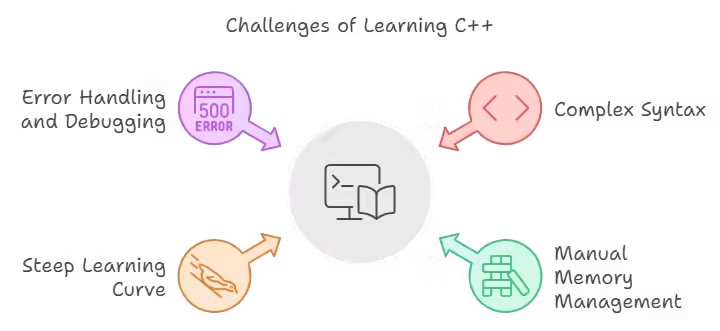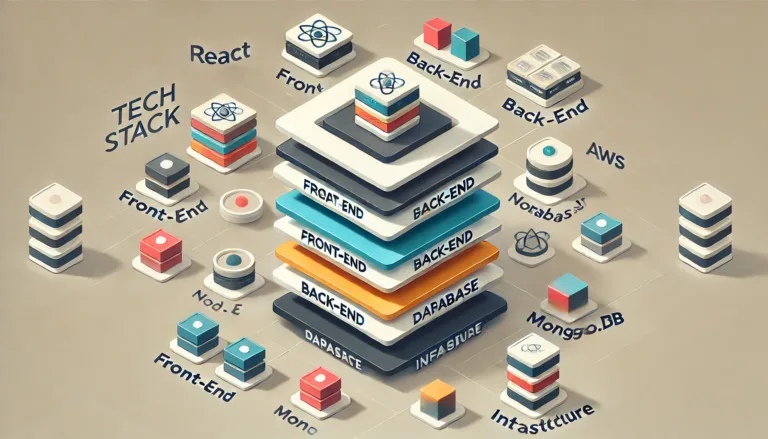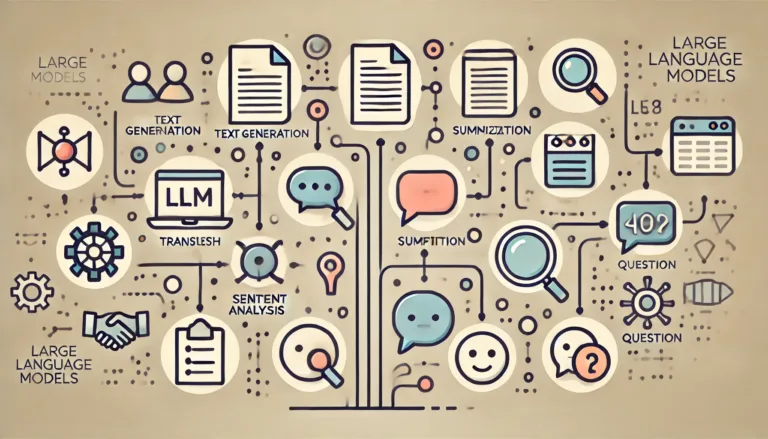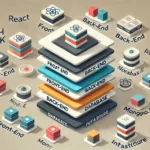Introduction
C++ is one of the most powerful and versatile programming languages available today. Originally developed by Bjarne Stroustrup in 1983, C++ builds upon the foundations of the C programming language, adding object-oriented capabilities and a variety of other features to enable high-performance programming. Its robustness has made it the go-to language for applications that require fine control over system resources, such as game development, systems programming, and complex simulations.
But as versatile as it is, C++ has a reputation for being challenging to learn, especially for beginners. This blog tackles the question: “Is C++ hard to learn?” The answer depends on several factors, including your prior programming experience, the learning resources you choose, and your personal learning style. For someone new to programming, C++ can feel overwhelming due to its intricate syntax, manual memory management, and deep feature set. Even for experienced programmers, C++ can present challenges not found in higher-level languages.
In this post, we’ll break down the reasons why C++ is considered a tough language to master, while also highlighting its many advantages. We’ll explore four primary challenges that new learners often face—complex syntax, manual memory management, steep learning curve, and error handling. Then, we’ll delve into the benefits of learning C++, from its powerful performance to the extensive career opportunities it can unlock. Lastly, we’ll recommend some of the best resources for tackling the C++ learning curve effectively.
Let’s dive into what makes C++ both rewarding and difficult to learn!

What Makes Learning C++ Challenging?
1. Complex Syntax
One of the initial hurdles for many learners is C++’s complex syntax. Compared to languages like Python or JavaScript, C++ has a far steeper syntax learning curve. While Python emphasizes readability and simplicity, C++ has a dense and intricate structure that includes a variety of data types, templates, and manual declarations that can intimidate beginners.
For instance, C++ relies heavily on pointers, which are variables that store the memory addresses of other variables. Pointers are fundamental to C++ because they enable direct memory manipulation, but for those new to programming, understanding how and when to use pointers can be perplexing. Additionally, C++ incorporates advanced features such as object-oriented programming (OOP) principles, including classes, inheritance, and polymorphism, which are not always intuitive at first.
Moreover, C++ syntax also requires a deeper understanding of concepts like scope, variable declaration, and control flow. For example, the language uses * and & symbols in multiple contexts (e.g., dereferencing pointers, referencing memory addresses), making the code harder to parse for beginners. This complexity is compounded by the need to differentiate between C-style syntax and modern C++ standards, leading to confusion over which conventions to follow.
2. Manual Memory Management
Another major challenge in learning C++ is mastering manual memory management. Unlike many modern languages, such as Java or Python, which handle memory allocation and deallocation automatically through garbage collection, C++ leaves this responsibility in the hands of the programmer. While this offers fine-grained control and can lead to more efficient programs, it also means a higher likelihood of introducing errors if memory is not handled properly.
Understanding pointers is crucial here. In C++, you allocate memory dynamically using new and deallocate it using delete. Failing to free memory correctly can lead to memory leaks, where the program consumes more and more memory over time without releasing it. On the flip side, deallocating memory too early can cause segmentation faults—one of the most frustrating errors for new developers.
Additionally, the distinction between stack and heap memory is important. The stack is used for static memory allocation, while the heap is used for dynamic allocation. Knowing when to use each, and how to transition between them using pointers, can significantly influence program behavior and stability. For beginners, the concepts of stack overflow, dangling pointers, and buffer overflows can be tough to grasp, making memory management a significant barrier.
3. Steep Learning Curve
The breadth of features in C++ makes the learning curve particularly steep. While languages like JavaScript allow developers to write functional programs with minimal understanding of underlying systems, C++ requires a more in-depth grasp of both low-level and high-level programming concepts.
In addition to syntax and memory management, new learners must contend with complex features like templates, the Standard Template Library (STL), and exception handling. Templates, for instance, allow for generic programming, enabling functions and classes to work with any data type. Although powerful, they can be highly complex, often requiring deep knowledge of type deduction and specialization rules.
The STL, on the other hand, is a collection of template-based data structures and algorithms, providing tools such as vectors, stacks, and queues. While immensely useful, mastering the STL involves understanding the subtleties of iterators, container types, and algorithm complexities. This can be overwhelming for those still getting comfortable with basic programming constructs.
Finally, C++’s exception handling system, which relies on try, catch, and throw constructs, introduces additional layers of control flow that are not present in simpler languages. Mastering these features takes considerable time and practice, making it challenging to reach a point of proficiency.
4. Error Handling and Debugging
Debugging C++ code can be a notoriously tricky endeavor, especially for beginners. Due to its complex type system and manual memory management, C++ is prone to errors that are both subtle and hard to trace. One common error type is the segmentation fault, which occurs when a program tries to access an illegal memory location. These faults are often caused by mishandling pointers, such as dereferencing a null pointer or accessing freed memory.
Another common issue is type-related errors. C++ enforces strong type checking, which means that incorrect type usage can lead to compilation failures or unexpected behavior. For example, mixing signed and unsigned integers in arithmetic operations can cause subtle bugs that are difficult to identify.
To tackle these issues, beginners must learn how to use debugging tools such as gdb (GNU Debugger) or IDE-integrated debuggers. These tools allow step-by-step code execution and memory inspection, which are invaluable for diagnosing problems. Additionally, tools like valgrind can help detect memory leaks and other dynamic memory issues, making it easier to pinpoint the source of errors.
However, the learning curve for these tools can be as steep as the language itself. Without a solid understanding of C++ internals, beginners can easily get lost in the myriad of error messages and cryptic warnings that C++ compilers generate. This adds an extra layer of complexity to learning the language, often making it frustrating for new programmers.

Why Learning C++ Is Worth the Effort
1. Versatility Across Domains
One of the strongest arguments for learning C++ is its versatility across a wide range of domains. C++ has been the backbone of software development in areas such as game development, systems programming, and embedded systems. Its close-to-hardware capabilities make it ideal for building high-performance applications that require fine-tuned resource management. Major gaming engines, such as Unreal Engine and Unity, utilize C++ for their core systems, allowing for the development of graphically intensive games with real-time performance.
In systems programming, C++ is used to build operating systems, drivers, and utilities that demand direct access to hardware and memory management. Additionally, in the realm of embedded systems, C++ is frequently employed to develop software for devices such as automotive control units, IoT devices, and robotics. The language’s efficiency and control make it perfect for applications where performance and memory usage are critical.
This versatility translates into numerous career opportunities for those skilled in C++. Mastering C++ opens doors to high-demand fields such as game development, AI, finance, cybersecurity, and aerospace engineering. Employers value developers with C++ skills because they can navigate complex codebases and optimize performance in ways that other higher-level languages cannot. For anyone looking to build a career that spans multiple industries, C++ provides the foundational skills to tackle a wide variety of technical challenges.
2. High Performance
C++ is renowned for its ability to produce high-performance applications. The language allows developers to write code that runs with minimal overhead, thanks to its support for low-level memory manipulation and its ability to work directly with hardware. In contrast to higher-level languages, C++ enables developers to control every aspect of the software’s performance, from memory usage to CPU cycles, making it possible to build lightning-fast applications.
This performance advantage is why C++ is often used in resource-intensive applications such as game engines, real-time simulations, and high-frequency trading platforms. For example, major video game engines like Unreal Engine leverage C++ to handle complex graphics rendering and physics calculations. Similarly, in the finance sector, C++ is used to create trading systems that need to process massive volumes of data with minimal latency.
C++’s performance capabilities are also critical in scientific computing, where simulations often require immense computational power. Applications like MATLAB and Blender use C++ under the hood to deliver the speed and efficiency necessary for advanced modeling and real-time rendering. Thus, for any project that prioritizes performance and speed, C++ remains a top choice.
3. Strong Foundation for Other Languages
Learning C++ provides a strong foundation for understanding other programming languages. Due to its historical significance and foundational concepts, C++ shares many principles and syntactical similarities with several modern languages, including C#, Java, and even Python. Mastering C++ can make it significantly easier to pick up these languages later on.
For example, C++ and C# both use object-oriented programming (OOP) paradigms, including concepts like inheritance, encapsulation, and polymorphism. Similarly, Java’s class structure and syntax are heavily influenced by C++. If you’re comfortable with C++’s stringent type system and manual memory management, transitioning to these higher-level languages, which handle many of these tasks for you, will be much smoother.
Furthermore, C++ enforces a deeper understanding of core programming concepts such as data structures, memory allocation, pointers, and algorithms. These skills are directly transferable to a multitude of languages and enable programmers to write more efficient, optimized code no matter what language they are using. In short, C++ acts as a bridge to understanding the nuances of both high-level and low-level programming, making it an excellent stepping stone for becoming a versatile developer.

4. Extensive Community and Learning Resources
Despite its complexity, the C++ community is extensive and highly supportive, with a wealth of resources available to learners at every stage. Because C++ has been around for several decades, it boasts a rich ecosystem of forums, tutorials, books, and mentorship options. Platforms like Stack Overflow and Reddit’s r/cpp are filled with experienced developers who can offer guidance and help troubleshoot issues that arise.
There are also specialized learning websites such as LearnCpp.com, which provide comprehensive tutorials tailored to beginners, and platforms like Coursera and Codecademy, which offer structured courses for learning C++ from the ground up. Additionally, there are countless YouTube channels, blog posts, and eBooks that break down complex C++ concepts into more digestible pieces.
Beyond online resources, C++ also has a vibrant community of meetups and conferences. Events like CppCon gather C++ enthusiasts from around the world to share insights, innovations, and best practices. These communities make it easy for newcomers to find mentors and network with professionals in the field.
Having access to such a wide array of learning tools and an active community can significantly ease the learning curve. It means that no matter what obstacle you face, there’s likely a resource or an experienced developer ready to help you solve it. This support network is invaluable for both beginners and advanced programmers alike, making the journey of learning C++ more manageable and less isolating.
Recommended Resources for Learning C++
1. Codecademy
Codecademy is a popular online platform that offers an immersive introduction to C++ through interactive tutorials and projects. The C++ course on Codecademy is structured to introduce the core concepts of the language, including variables, loops, and functions, while gradually moving into more complex topics like classes and object-oriented programming. The emphasis is on hands-on learning—users can immediately apply new knowledge by writing and running C++ code within Codecademy’s built-in coding environment.
This platform is particularly well-suited for beginners who prefer a project-based learning approach. If you’re someone who wants to see immediate, tangible results from coding exercises, Codecademy’s style will likely resonate. The platform is also designed to offer quick feedback on your code, which helps reinforce learning and minimizes frustration. Furthermore, Codecademy’s curriculum is designed to be approachable for those with no prior programming experience, making it ideal for newcomers to C++.
2. LearnCpp.com
LearnCpp.com is a comprehensive online resource that offers detailed tutorials designed to guide learners from the basics of C++ through to advanced topics. What makes LearnCpp.com unique is its focus on clear, practical examples and step-by-step explanations. Each topic is broken down into smaller, digestible lessons, allowing learners to grasp complex concepts at their own pace. The site covers everything from syntax and data types to memory management, object-oriented programming, and the Standard Template Library (STL).
The content is structured to cater to different learner levels, from complete beginners to those looking to deepen their understanding of specific C++ features. Beginners benefit from the thorough foundational tutorials, while intermediate and advanced learners can dive into the specialized sections to refine their skills in areas like templates, exception handling, and advanced C++ techniques. With exercises included at the end of most lessons, LearnCpp.com encourages readers to practice actively, which is essential for mastering a language as complex as C++.
3. Programiz
Programiz offers well-organized, structured tutorials that cater to a broad audience, from beginners to more experienced developers. The site is known for its step-by-step format, which takes learners through fundamental C++ topics like control structures, loops, and arrays, before progressing to more advanced areas such as file handling, data structures, and object-oriented programming.
Each tutorial is paired with executable code snippets that can be run directly on the site, providing instant feedback and helping users see how theoretical concepts translate into actual code. This interactive approach makes Programiz ideal for learners who want to follow along with practical examples and experiment on their own. Additionally, the site’s modular structure allows users to pick and choose topics based on their current skill level, making it a flexible resource for learners at any stage.
4. Coursera’s Coding for Everyone
Coursera’s Coding for Everyone series offers free courses that cover both C and C++ basics, making it a great starting point for absolute beginners. These courses are part of a larger specialization in programming and include video lectures, quizzes, and programming assignments designed to build a solid foundation. The curriculum starts with an introduction to the fundamentals of programming using C, then gradually shifts focus to C++, covering topics such as object-oriented programming, memory management, and standard libraries.
One of the standout benefits of Coursera’s platform is its certification. Upon completing the course, learners receive a verified certificate that they can add to their resume or LinkedIn profile, demonstrating their newly acquired skills to potential employers. This makes Coursera’s courses not just a learning opportunity but also a career-boosting tool for those looking to formally showcase their C++ expertise.
5. YouTube Channels
YouTube is a treasure trove of C++ learning resources, and channels like Caleb Curry provide extensive video tutorials that cater to both beginners and advanced programmers. Caleb Curry’s channel, in particular, stands out for its clear explanations and step-by-step walkthroughs that break down complex topics such as data structures, pointers, and object-oriented programming into manageable parts.
Video tutorials are ideal for visual learners who benefit from seeing code written and executed in real time. Channels like Caleb Curry’s often use diagrams and visual aids to reinforce key concepts, making it easier to understand abstract programming ideas. Other recommended YouTube channels include The Cherno, which focuses on C++ for game development, and freeCodeCamp, which offers comprehensive tutorials for beginners. The visual format, combined with the ability to pause, rewind, and follow along, makes YouTube a powerful supplemental resource for those tackling C++.
Tips for Overcoming C++ Learning Challenges
1. Start Small and Build Gradually
One of the best strategies for tackling C++ is to start small and build up gradually. Given the language’s complexity, jumping straight into advanced topics like templates or multi-threading can be overwhelming. Instead, focus on writing simple programs that utilize basic syntax, loops, and functions. For instance, begin with basic tasks like building a calculator or implementing simple algorithms such as sorting and searching.
The key is to master one concept at a time before moving on to the next. This incremental approach not only builds confidence but also ensures that you have a solid grasp of foundational concepts like variables, control structures, and functions. Once you’re comfortable, you can slowly introduce more advanced topics, such as classes, inheritance, and memory management, into your projects. By setting small, achievable goals, you’ll maintain steady progress without getting overwhelmed.
2. Practice Memory Management Early
Since manual memory management is one of C++’s biggest challenges, it’s crucial to practice working with pointers and dynamic memory allocation early on. Start with small exercises that require you to allocate and deallocate memory using new and delete, such as creating and freeing dynamic arrays. Understanding the nuances of pointers—such as pointer arithmetic, referencing, and dereferencing—can help prevent common errors like segmentation faults and memory leaks.
A great exercise is to implement a simple linked list or a binary tree, both of which require careful memory allocation and pointer manipulation. These projects will solidify your understanding of stack vs. heap memory, dangling pointers, and other critical concepts. Additionally, don’t shy away from experimenting with smart pointers (std::shared_ptr and std::unique_ptr), which are safer alternatives for managing memory and can significantly reduce the likelihood of memory-related bugs.
3. Use Debugging Tools from the Start
Debugging C++ code can be daunting, but using the right tools from the beginning can make the process far more manageable. Start by using a full-featured Integrated Development Environment (IDE) like Visual Studio, CLion, or Code::Blocks, which come equipped with built-in debugging tools. These IDEs allow you to set breakpoints, inspect variable values, and step through your code line-by-line, making it easier to identify where things go wrong.
Additionally, learn to use command-line debuggers like GDB (GNU Debugger) if you prefer working with a minimalist environment. For memory management issues, tools like Valgrind can help detect memory leaks, buffer overflows, and invalid memory access. Another valuable tool is AddressSanitizer, which is integrated into most modern C++ compilers and can identify memory corruption issues in your code.
Mastering these debugging tools early on will not only help you resolve errors more efficiently but will also deepen your understanding of how C++ programs execute under the hood. Being able to confidently navigate through cryptic error messages and locate bugs is a crucial skill that separates proficient C++ developers from beginners.
4. Join Online Communities
Learning C++ can sometimes feel like a solitary journey, but it doesn’t have to be. Joining online communities can provide both motivation and support when you’re struggling with tough concepts or debugging stubborn errors. Participating in forums like Reddit’s r/cpp or Stack Overflow can expose you to a diverse group of learners and experienced developers who are willing to share their insights and solutions.
Communities like these are also great for discussing best practices, sharing code snippets, and learning about the latest trends in C++ development. Don’t hesitate to ask questions, no matter how basic they might seem—chances are, others have faced the same challenges and can offer advice. In addition to forums, consider joining Discord servers or Slack channels dedicated to C++ programming, where you can engage in real-time discussions, seek feedback on your projects, and find mentorship opportunities.
By actively engaging with the C++ community, you’ll gain exposure to different perspectives, discover new learning resources, and find camaraderie with others navigating the same learning path. It’s an invaluable way to stay motivated and continue pushing through the inevitable roadblocks you’ll encounter.
Conclusion
Learning C++ is undoubtedly challenging, but it offers significant rewards for those willing to invest the time and effort. The complexities of its syntax, manual memory management, and steep learning curve can be intimidating for beginners. However, overcoming these obstacles equips you with a deep understanding of both low-level and high-level programming principles, making C++ a valuable skill in a developer’s toolkit.
The benefits of mastering C++ extend beyond its technical intricacies. As a versatile language, C++ is widely used in diverse fields like game development, embedded systems, and systems programming, providing numerous career opportunities. Its high-performance capabilities make it a go-to choice for applications that require speed and efficiency. Furthermore, learning C++ builds a strong foundation for understanding other programming languages, thanks to its shared concepts and syntactical similarities.
While the learning curve can be steep, the extensive resources available—from Codecademy’s beginner-friendly tutorials to the in-depth explanations on LearnCpp.com—make the journey more manageable. Coupled with a supportive community, these resources ensure that you have plenty of guidance and help along the way.
So, is C++ hard to learn? Yes, but the rewards make it worthwhile. With patience, practice, and the right learning strategies, anyone can master C++ and unlock the doors to exciting programming opportunities. Start small, practice often, and don’t hesitate to leverage the wealth of resources and communities available. Your C++ journey, while challenging, will ultimately be a rewarding endeavor that sets you apart as a skilled and versatile programmer.
If you are looking for a little easier programming language to start you can also check these articles out!
- How Long Does It Take to Learn Python? (Start Now)
- How Long Does It Take to Learn Java? A Complete Timeline Breakdown
- Top 8 High-Level Programming Languages: Benefits, Use Cases, & Pros
- Best Programming Languages to Learn
Citations/References
- 7 Top Online Resources to Learn C++
- Wiingy’s Best Resources to Learn C++
- Princeton Research Computing: C++ Resources
- Class Central Report: Best C++ Courses
- Toptal: The Ultimate List of Resources to Learn C and C++
- LearnCpp.com
- Reddit: Best Resources and Ways to Learn C++
Frequently Asked Questions (FAQ)
1. How long does it take to learn C++?
The time required to learn C++ varies based on your prior programming experience and the amount of time you dedicate to practice. For beginners, it typically takes around 3 to 6 months to get comfortable with the basics, while mastering more advanced topics can take a year or more.
2. Is C++ suitable for beginners with no programming experience?
While C++ can be more challenging for absolute beginners due to its complex syntax and manual memory management, it is still a valuable language to learn. Beginners can succeed by starting small, using beginner-friendly resources, and progressing gradually.
3. What is the best IDE for learning C++?
Popular IDEs for C++ beginners include Visual Studio, CLion, and Code::Blocks. These IDEs offer built-in debugging tools, syntax highlighting, and user-friendly interfaces, making them ideal for learning and building projects.
4. Can learning C++ help me with other programming languages?
Absolutely! Learning C++ provides a solid foundation for understanding languages like C#, Java, and even Python. Concepts such as object-oriented programming, data structures, and memory management are directly transferable, making it easier to pick up other languages.
5. What are some good projects to start with in C++?
Begin with small projects like a basic calculator, a number guessing game, or a simple text-based RPG. As you advance, try implementing data structures (like linked lists or binary trees) and then move on to larger projects, such as a basic game engine or a file compression tool.









